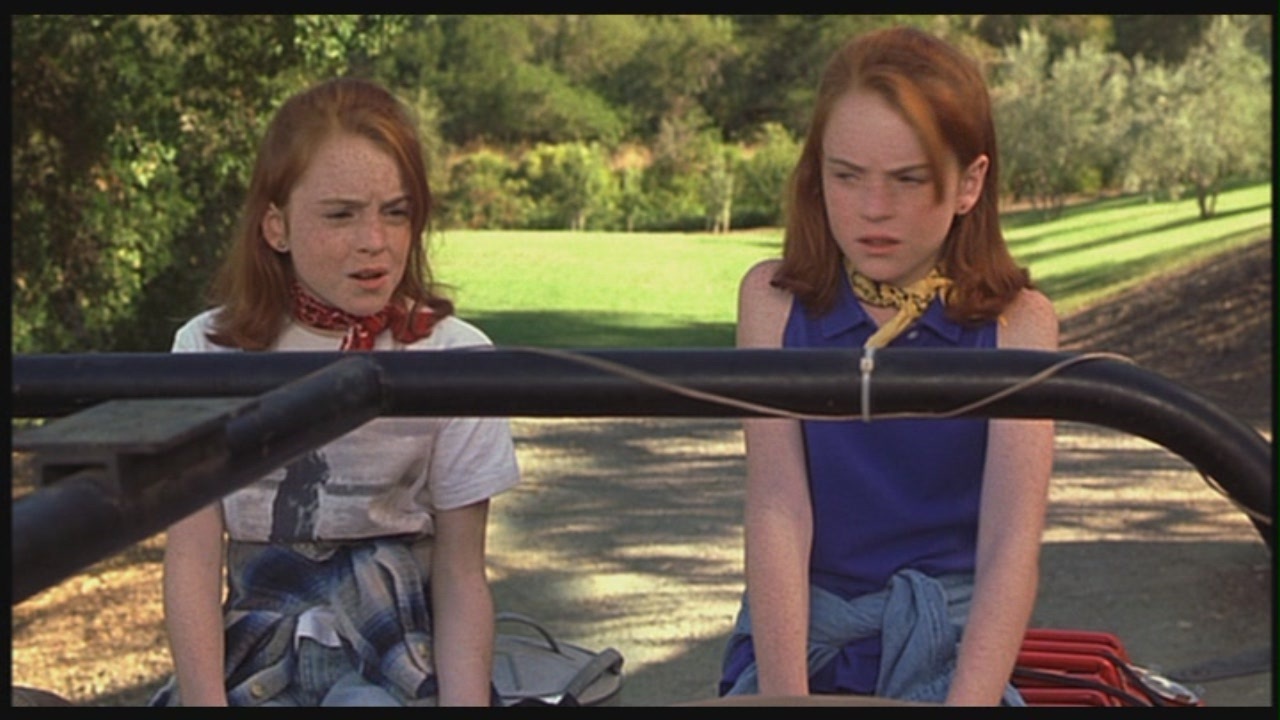
Nick realizes Meredith’s true colors toward his children and chooses the twins over her while breaking off the engagement and wedding. Over the course of the trip, Hallie and Annie play a number of harmless tricks on Meredith, who becomes enraged and demands Nick chooses between her and them. Elizabeth tricks Meredith into taking her place on the camping trip at the last minute, much to the girls’ dismay. The twins resort to a last-ditch effort by demanding a three-day family camping trip, refusing to reveal which twin is which until after they return. Hallie and Annie recreate the night their parents met by renting out a yacht for an evening, but ultimately fail to rekindle Nick and Elizabeth’s relationship. Chessy and Martin meet and grow romantically attracted to each other. Nick sees Elizabeth for the first time in years, and they learn they have been tricked by their daughters into meeting again, as well as Nick discovering he’s had Annie in his care since the end of camp. On the same weekend, Annie, Nick, and Meredith travel to the same hotel to discuss wedding plans. The two of them, along with Martin, travel to do so, with Elizabeth nervous to meet Nick again. Hallie tells Elizabeth that Nick wants to meet her in San Francisco in order to switch the girls back. Meanwhile, Chessy grows suspicious of “Hallie’s” odd behaviour, and “Hallie” confesses she is really Annie, but Chessy keeps her secret. Hallie sneaks out to call her sister from a phone booth but is discovered by Charles, who persuades her to reveal her identity to Elizabeth. Meanwhile, Annie imitates Hallie’s American accent and flies to Napa Valley to meet their father, Hallie’s nanny Chessy, and the Parker’s’ dog Sammy.Īnnie learns that Nick has a new, young girlfriend, Meredith, a child-hating gold digger, to whom he intends to propose. Hallie imitates Annie’s British accent and flies to London to meet their mother, maternal grandfather Charles, and the James’ butler Martin. Desperate to meet the parent they never knew, they make a plan: switching places to reunite their family, with hopes of getting their parents back together. During a heart-to-heart, they discover they are twin sisters. After one prank goes too far, the two girls are isolated together for the remainder of camp as punishment.
#Parent trap full free moviee1998 series#
They begin to pull a series of pranks on each other. Shortly after the birth of their identical twin daughters, Annie and Hallie, they get divorced and each has sole custody of one girl Nick raises Hallie in Napa Valley, California and Elizabeth raises Annie in London, England.Īlmost twelve years later, in the summer of 1998, Nick and Elizabeth coincidentally send their daughters to the same summer camp in Maine, where they meet and take an immediate dislike to one another. In 1986, American winery owner Nicholas Parker and British wedding gown designer Elizabeth James get married over the course of a transatlantic crossing on the Queen Elizabeth 2.

#Parent trap full free moviee1998 movie#
The Parent Trap exposes the true costs of our society’s unrealistic expectations around parenting and lays out a profoundly hopeful blueprint for reform.This week the movie will be the movie “The Parent Trap (1998)” on August 11th.

To make it happen, parents need to organize to wield their political power on behalf of children-who will always be the largest bloc of disenfranchised people in this country.

We need a program like Medicare-call it Familycare-to drive this investment. America should consider child development a public investment with a monumental payoff.

How do we fix this? The solution, Hilger argues, is to ask less of parents, not more. Parents are expected not only to care for their children but to help them develop the skills they will need to thrive in today’s socioeconomic reality-but most parents, including even the most caring parents on the planet, are not trained in skill development and lack the resources to get help. In The Parent Trap, Nate Hilger combines cutting-edge social science research, revealing historical case studies, and on-the-ground investigation to recast parenting as the hidden crucible of inequality. It’s almost as if parents are set up to fail-and the result is lost opportunities that limit children’s success and make us all worse off. If they ask for help, they are made to feel inadequate there is no centralized organization to represent their interests and there is virtually nothing spent on research and development to help them achieve their goals. Yet this vital work receives little political support, and its primary workers-parents-labor in isolation. Few people realize that raising children is the single largest industry in the United States. How parents have been set up to fail, and why helping them succeed is the key to achieving a fair and prosperous society.


 0 kommentar(er)
0 kommentar(er)
